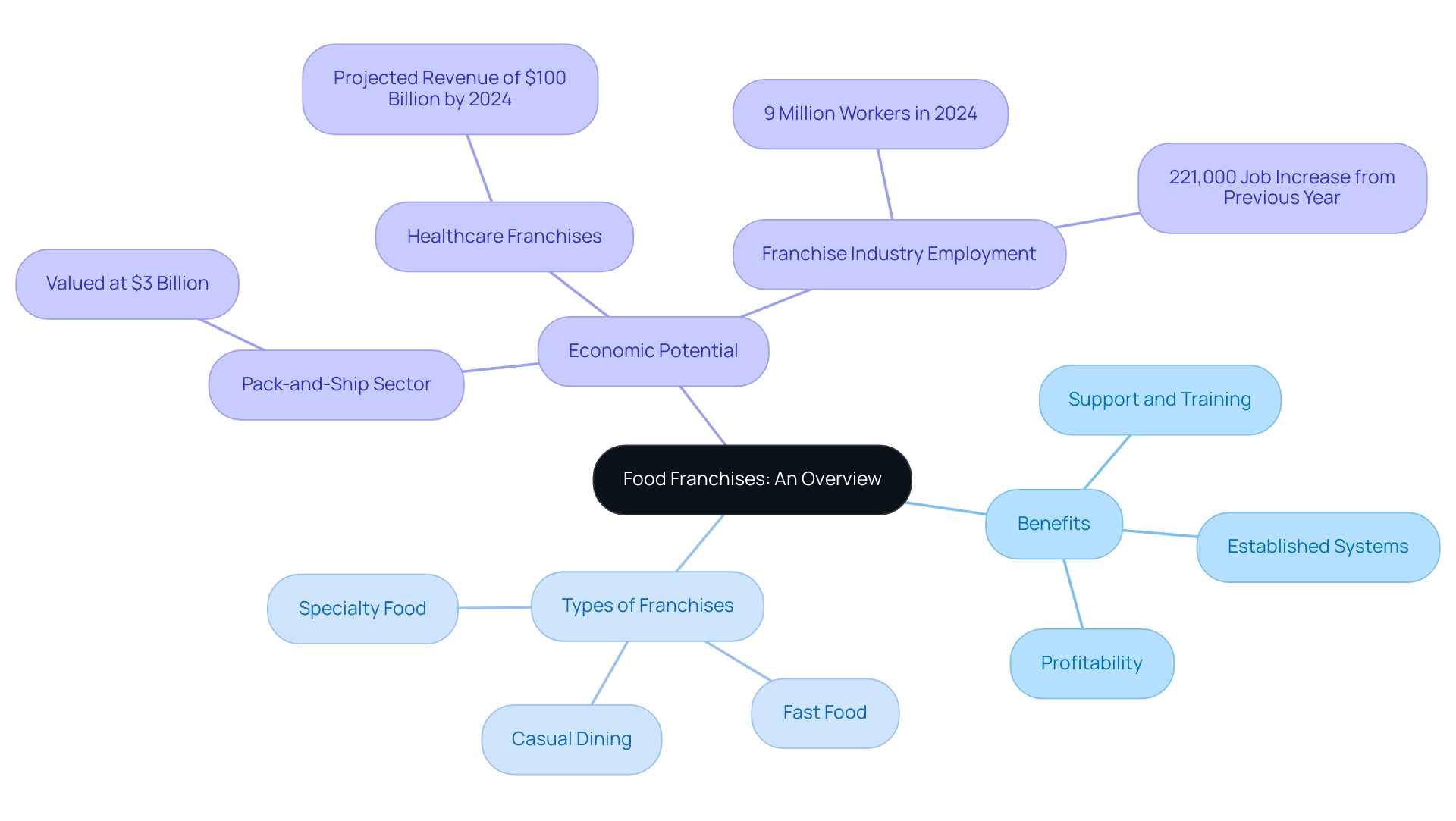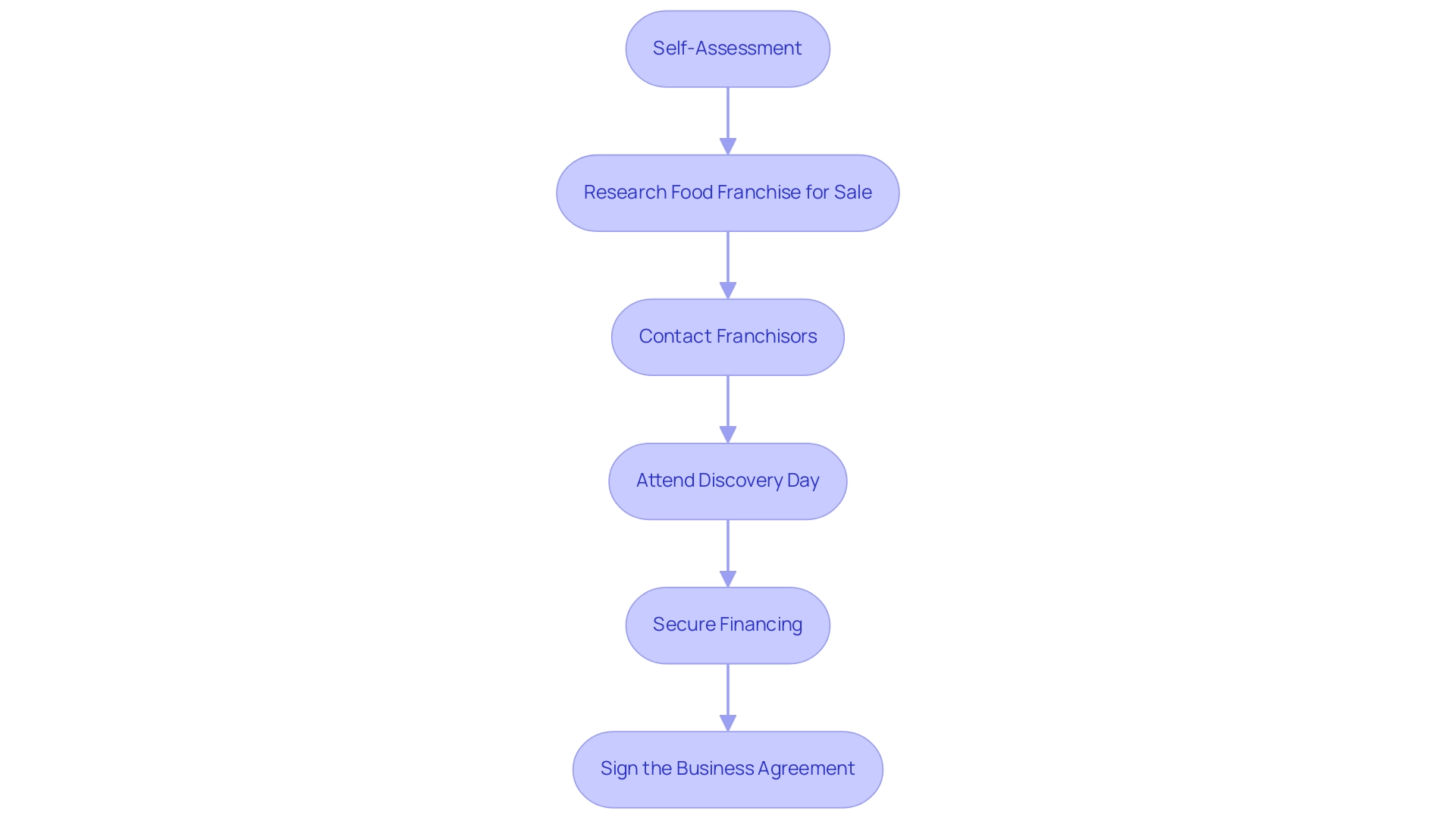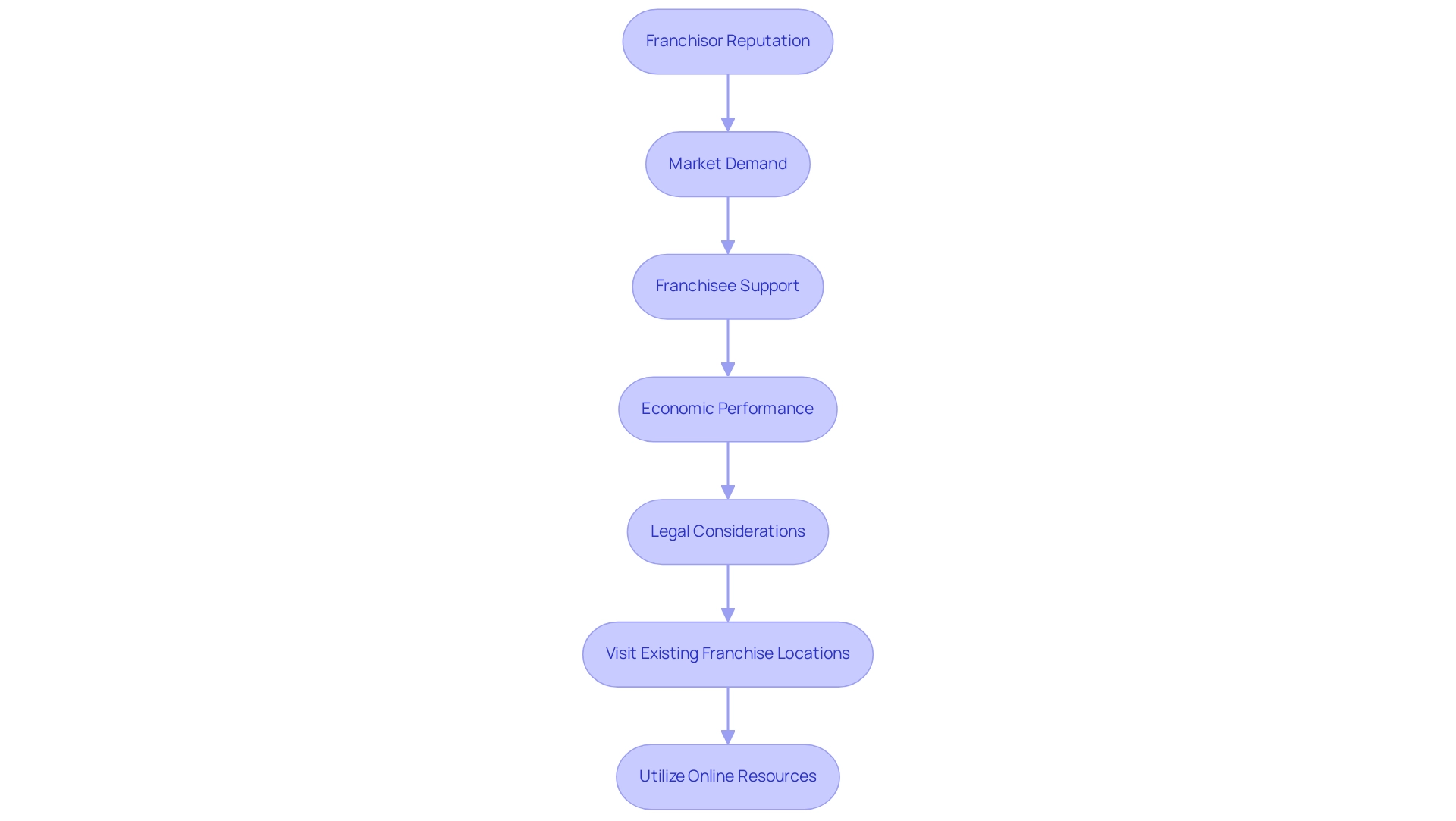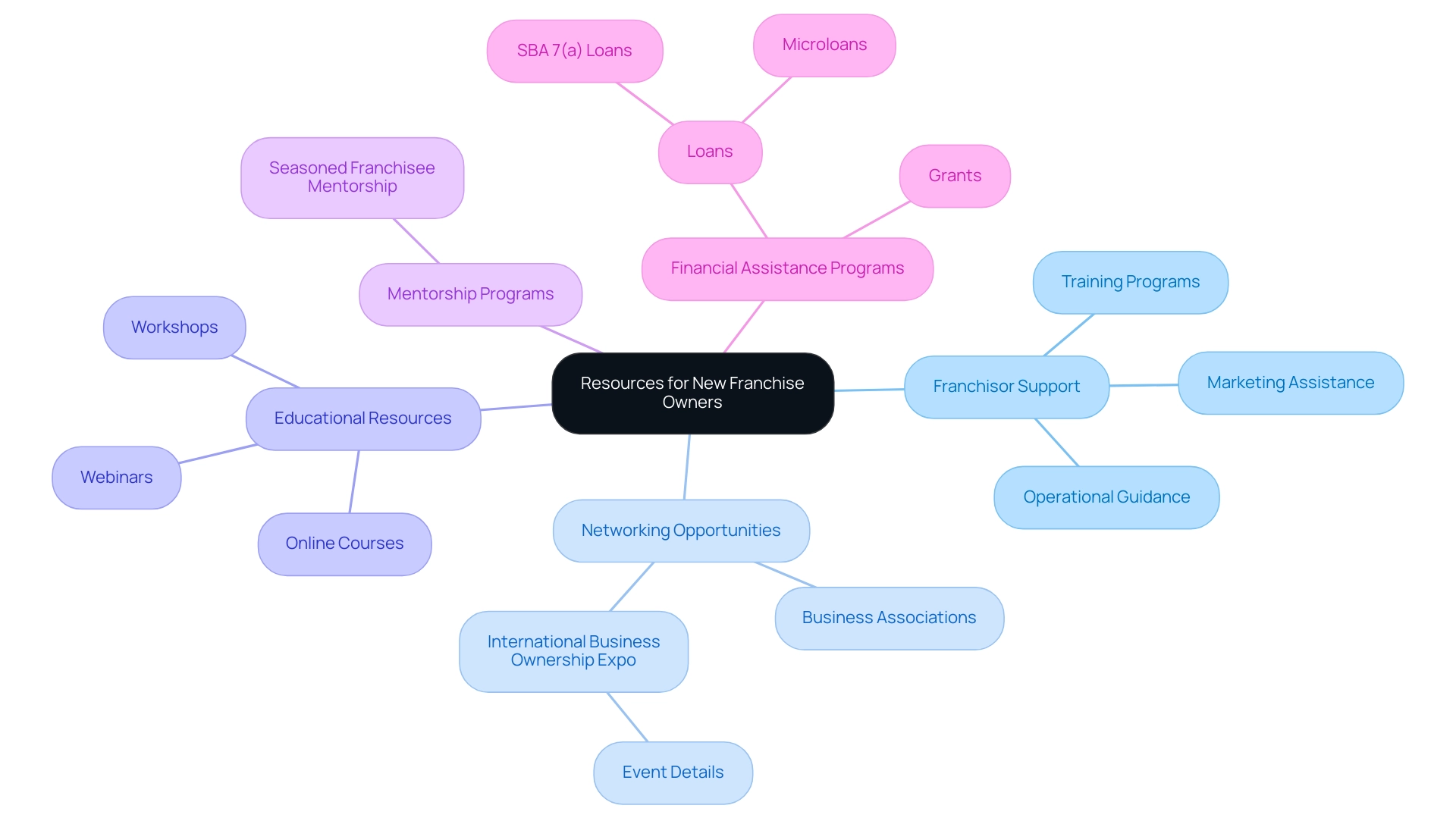Overview
Are you considering a food franchise for sale? You’re not alone in feeling both excited and overwhelmed by this journey. It’s a significant step that can lead to a fulfilling career transition, but it’s essential to approach it thoughtfully. Start with a self-assessment to understand your motivations and goals. This reflection can help you navigate the challenges ahead.
Next, dive into thorough research. Understanding the market and the franchises available can be daunting, but it’s crucial for making an informed decision. Reach out to franchisors for essential documents; this will provide clarity and confidence in your choices. Remember, you are not alone in this process—many have walked this path before you.
Securing financing is another vital step. It may feel overwhelming, but with the right resources and support, you can find a solution that works for you. The structured approach of self-assessment, research, and financial planning, combined with the support offered by franchisors, significantly enhances your chances of success in a competitive market.
By taking these steps, you’re setting the foundation for a rewarding venture. Embrace this opportunity for growth and transformation; it could lead to a career that not only fulfills your aspirations but also brings joy to your life. Remember, the journey may be challenging, but with determination and the right support, you can achieve your dreams.
Introduction
In the ever-changing landscape of business, food franchises emerge as a promising avenue for aspiring entrepreneurs seeking a fulfilling career. We understand that the journey can be daunting, but these ventures provide an opportunity to operate under the guidance of established brands. This means you can benefit from their recognition and operational support, easing some of the burdens of starting from scratch.
Imagine the potential for profitability with reduced risk compared to launching an independent business. It’s no wonder that food franchises attract a diverse range of investors, from those dreaming of fast food to those passionate about specialty dining. As you navigate this path, understanding the unique characteristics of various franchise types is crucial. This knowledge can help align your passions with your financial aspirations.
As the industry evolves, remember that you are not alone. Leveraging the support and resources available can illuminate your way to successful ownership. We believe that with the right guidance, your journey in the food sector can lead to both personal fulfillment and professional success.
Understanding Food Franchises: An Overview
Food franchises for sale represent a compelling business model. Here, individuals, known as operators, acquire the rights to operate under the brand and operational guidelines of an established company, referred to as the brand owner. This model offers numerous advantages, including significant brand recognition, a proven business framework, and robust support from the franchisor. The appeal of restaurant chains is underscored by their potential for profitability, lower risk compared to starting an independent venture, and the capacity to access an established customer base.
Understanding the various types of food franchises for sale—ranging from fast food and casual dining to specialty food—can empower prospective buyers to identify options that resonate with their interests and financial aspirations. In 2025, brand recognition remains a critical factor. Experts note that businesses with strong branding often outperform independent companies in customer loyalty and sales.
- Support and Training: We understand that starting a new venture can be daunting. Business owners typically receive comprehensive training and ongoing support, which is invaluable for first-time entrepreneurs. This support can encompass everything from operational training to marketing strategies, ensuring that business owners are well-equipped to succeed. This aspect is especially advantageous for career transitioners moving from Corporate America to owning a food franchise for sale.
- Established Systems: You are not alone in feeling overwhelmed by the challenges of starting anew. Food businesses come with established operational systems that streamline processes and reduce the learning curve for new owners. This framework enables business owners to concentrate on expanding their operations instead of grappling with the complexities of beginning from scratch.
- Profitability: Recent data shows that culinary chains remain a profitable investment, with many achieving financial success within the initial years of operation. In 2024, the industry employed nearly 9 million workers, reflecting a robust growth trajectory that underscores the sector’s resilience and potential for success.
- Diverse Opportunities: Beyond traditional quick service, various sectors within the industry, such as healthcare and pack-and-ship businesses, are showing significant economic potential. For instance, the pack-and-ship business sector is valued at $3 billion, highlighting the various opportunities available for aspiring business owners. Moreover, healthcare networks are anticipated to produce $100 billion in revenue by 2024, demonstrating the considerable economic potential of various sectors beyond conventional fast dining.
In conclusion, restaurant chains that represent a food franchise for sale provide a distinctive combination of assistance, brand strength, and established systems that can greatly aid new business proprietors. By leveraging these advantages, individuals can embark on a fulfilling career path with a solid foundation for success. Furthermore, as advances in automation and technology, including AI, continue to evolve, they may enhance operational efficiency within food businesses, making them even more appealing to career transitioners seeking new opportunities.
At Find Your Career 2.0 | Career Ownership Coach Parnell Woodard, we can assist you in exploring these options, whether you decide to remain in Corporate America, start your own business, or invest in a business opportunity.

Step-by-Step Process to Purchase a Food Franchise
-
Self-Assessment: It’s important to start by evaluating your skills, interests, and economic situation. This self-reflection is crucial to determine if owning a culinary business aligns with your personal and professional objectives. Consider your passion for the culinary sector, your management abilities, and your financial readiness to invest. Resources like ‘Your Career 2.0: A Survival Guide for The Battered Career Syndrome and Investor Syndrome’ from Find Your Career 2.0 | Career Ownership Coach Parnell Woodard can offer valuable insights into assessing your readiness for this transition.
-
Research Food Franchise for Sale: Take the time to thoroughly research various food franchises for sale that resonate with your interests and financial capacity. Focus on options that feature a strong support system and have garnered positive feedback from current participants. Engaging with current operators of a food franchise can provide invaluable insights into daily operations, profit margins, and the level of support offered by the franchisor. Remember, talking to current franchisees is essential for understanding the daily operations and challenges, which can greatly inform your decision-making process.
-
Contact Franchisors: Once you have identified potential business opportunities, reach out to their franchisors to request the Franchise Disclosure Document (FDD). This document is a vital resource, containing essential information about the business, including fees, obligations, and operational guidelines.
Review the FDD: Take the time to analyze the FDD meticulously, paying close attention to franchise fees, ongoing royalties, and the franchisor’s commitments to you as a franchisee. Understanding these financial obligations is crucial for making an informed decision.
-
Attend Discovery Day: Many franchisors host a Discovery Day, providing an opportunity for prospective franchisees to meet the team, tour the facilities, and ask questions. This event can significantly influence your decision, as it allows you to gauge the franchisor’s culture and support.
-
Secure Financing: It’s essential to determine your financing strategy for the business purchase. This might involve utilizing personal savings, applying for loans, or exploring grants. Understanding your financial options will empower you to navigate the investment process more effectively.
-
Sign the Business Agreement: After completing your research and securing financing, you can confidently sign the business agreement, officially becoming a licensee. This step marks the beginning of your journey into business ownership.
Training and Opening: Engage in the training provided by the franchisor, designed to equip you with the necessary skills and knowledge for successful operations. Prepare for the grand opening of your business, ensuring that all aspects are in place for a successful launch.
Additionally, consider the potential profitability of owning a business; for instance, the annual worth of the urgent care health establishment is $30 billion. Furthermore, with adult consumers being 30% more likely to use restaurant technology in 2024, leveraging technology will be crucial for the success of your business. Lastly, optimizing your Google Business Profile is essential, as 88% of consumers use Google Maps for local searches, highlighting the importance of effective marketing strategies.

Financial Insights: Costs and Fees of Food Franchises
When considering the purchase of a food business, it’s essential to fully understand the various costs involved in this important investment.
-
Initial Business Fee: Typically, this fee ranges from $20,000 to $50,000, depending on the brand. However, some brands may charge significantly more, with fees reaching up to $1 million for premium businesses. As noted by Toast, these fees can vary widely depending on the brand, and it’s crucial to be aware of this before making a commitment.
-
Startup Costs: These encompass a range of expenses, including equipment, inventory, signage, and leasehold improvements. Overall, the expenses for starting a food franchise can vary from $100,000 to $500,000, depending on the business’s scale and location. For example, Sweetberry Bowls requires an initial investment ranging from $123,700 to $260,000, demonstrating the variability in startup expenses across different food businesses. Additionally, Ben & Jerry’s offers business opportunities with costs for full-size shops ranging from $237,800 to $549,300, in-line shops from $250,800 to $384,800, and kiosks from $155,900 to $331,800.
-
Ongoing Royalties: Most establishments require ongoing royalty payments, typically a percentage of gross sales, usually between 4% and 8%. This is an essential factor to consider, as it directly impacts your bottom line.
-
Marketing Fees: Franchisees are often asked to contribute to a national or local marketing fund, which can add an additional 1% to 3% of sales to their expenses. This investment is vital for maintaining brand visibility and competitiveness in the market.
-
Operational Costs: Ongoing expenses such as rent, utilities, payroll, and supplies can significantly impact profitability. It’s crucial to consider these expenses in your financial planning to ensure sustainable operations.
Budgeting Tips
- Create a Detailed Budget: Developing a comprehensive budget that outlines all potential costs can help ensure you sustain operations until the business becomes profitable. This proactive approach can alleviate monetary strain during the initial stages.
- Consult with Financial Experts: Engaging with financial professionals can provide valuable insights into the implications of your investment and help you explore various funding options. Their expertise can guide you in making informed decisions that align with your financial goals.
- Leverage Technology: Utilizing restaurant technology, such as online ordering systems, can enhance customer experience and optimize business performance, which is crucial for maintaining a competitive edge.
Understanding these financial aspects is vital for anyone looking to embark on a business journey involving a food franchise. By preparing adequately and seeking expert advice, you can navigate the complexities of business ownership with confidence. The case study of Chick-fil-A illustrates a successful business model where the company owns all locations, resulting in a low licensing fee and a highly selective selection process for operators, focusing on alignment with company values. This model has made Chick-fil-A one of the most profitable fast-food chains, generating significant annual sales. Remember, you are not alone in this journey, and with the right support and knowledge, you can achieve your aspirations.

Conducting Research: Key Factors to Consider Before Buying
When considering the purchase of a food franchise, it’s essential to reflect on several key factors, particularly for those navigating career transitions and seeking empowerment through business ownership:
- Franchisor Reputation: It’s important to investigate the franchisor’s history, including their success rate and the level of support they provide to franchisees. Reading reviews and testimonials from current business owners can offer valuable insights into their experiences and satisfaction. This information is crucial for anyone looking to regain control over their career path.
- Market Demand: Take the time to evaluate the demand for the business’s products or services within your target market. This means analyzing local competition and understanding consumer preferences, which are vital for ensuring long-term viability. The restaurant industry continues to thrive, presenting substantial growth opportunities driven by changing consumer preferences. For example, various sectors within the industry show remarkable economic potential, such as pack-and-ship operations worth $3 billion and healthcare businesses projected to generate $100 billion in revenue by 2024.
- Franchisee Support: Assess the extent of support offered by the franchisor, including training, marketing, and operational assistance. A robust support system can significantly impact your success when considering a food franchise for sale, especially in the competitive food industry, and is essential for those transitioning from traditional employment.
- Economic Performance: Request economic performance representations from the franchisor to gauge the potential profitability of the business. Understanding the financial landscape is crucial, particularly as different sectors within the industry exhibit considerable economic potential. Moreover, with 21 states set to increase minimum wages in 2025, it’s important to consider how this may affect operational costs.
- Legal Considerations: Engage a legal attorney to carefully review the agreement, ensuring you fully comprehend your rights and obligations. This step is vital to protect your interests and facilitate a smooth transition into business ownership.
Research Strategies
- Visit Existing Franchise Locations: Interact with current franchisees to gain firsthand insights into their experiences and the challenges they encounter. This direct engagement can provide a clearer picture of what to expect and how to navigate potential hurdles.
- Utilize Online Resources: Make use of directories, forums, and review sites to gather comprehensive information about various business opportunities. With 88% of consumers relying on Google Maps for local searches, optimizing your online presence is also crucial for attracting customers. This optimization can significantly enhance visibility and customer engagement.
As Parnell Woodard, a Career Ownership Coach, emphasizes, “I am dedicated to helping clients transition from traditional employment to career ownership, empowering them to achieve their career goals.” By thoroughly assessing these factors and utilizing effective research strategies, you can make informed decisions that align with your career ownership objectives in the food franchise for sale sector. Additionally, considering successful business models like McDonald’s, Dunkin’, and Subway can provide valuable insights into customer loyalty and operational success, reinforcing the principles outlined in ‘Your Career 2.0: A Survival Guide for The Battered Career Syndrome and Investor Syndrome.’
To further assist you in navigating the purchasing process, be sure to get your copy of ‘Your Career 2.0’ and explore how it can guide you through each step of your journey.

Leveraging Support: Resources for New Franchise Owners
As a new business owner, we understand that effectively leveraging available support and resources is essential for achieving success in the competitive market of food franchises for sale.
-
Franchisor Support: Most franchisors offer extensive training programs, marketing assistance, and operational guidance tailored to help you thrive. This organized assistance is vital, as it equips you with the necessary tools to navigate the complexities of running a business. As Keith, a Brand Manager at NY Engineers, emphasizes, understanding franchisor support is crucial before embarking on your business journey.
-
Networking Opportunities: Engaging with business associations and local groups can significantly enhance your experience. These platforms allow you to connect with fellow business owners, share insights, and learn from their journeys, fostering a sense of community and collaboration. Attending events like the International Business Ownership Expo, occurring from May 30th to June 1st, 2024, in New York City, offers a unique chance to meet face-to-face with over 300 exhibiting business brands and industry experts. This expo is the largest business show in the U.S., connecting entrepreneurs with valuable resources and educational seminars. Be sure to register early to secure your spot and maximize your networking potential.
-
Educational Resources: Take advantage of online courses, webinars, and workshops focused on business management and operations. These resources are designed to keep you informed about industry trends and best practices, ensuring you remain competitive.
-
Mentorship Programs: Actively seek mentorship opportunities with seasoned franchisees. Their firsthand experiences can provide invaluable insights and advice, helping you avoid common pitfalls and make informed decisions.
-
Financial Assistance Programs: Investigate grants, loans, and funding options specifically tailored for franchise owners, such as those offered by the U.S. Small Business Administration. The SBA provides various funding products, including 7(a) loans for startup costs and microloans for smaller funding needs. These financial resources can alleviate startup costs and provide a solid foundation for your new venture.
Additionally, optimizing your online presence is crucial, as 88% of consumers use Google Maps for local searches. This statistic underscores the importance of ensuring that your business is easily discoverable online.
By utilizing these resources, you can establish a robust foundation for your enterprise, significantly increasing your chances of long-term success. The competitive landscape is exemplified by industry leaders like McDonald’s, which, despite its dominance with over 13,300 locations in the U.S. and $113 billion in revenue, demonstrates that effective support systems for franchisees are crucial for success in any food franchise for sale. As the franchise landscape evolves, remember that the right support can make all the difference in achieving a fulfilling career in a food franchise for sale.

Conclusion
Food franchises offer a viable and rewarding path for aspiring entrepreneurs, combining the benefits of brand recognition, established operational systems, and robust support from franchisors. We understand that navigating this journey can feel overwhelming, but by recognizing the unique characteristics of different franchise types and the advantages they offer, you can confidently align your business choices with your personal interests and financial goals.
The journey to franchise ownership involves thoughtful steps, from self-assessment to thorough research and financial planning. It’s essential to acknowledge the importance of franchisor reputation, market demand, and the level of support provided, as these factors can significantly influence your success as a new franchisee. Additionally, being mindful of costs, ongoing royalties, and operational expenses ensures that your financial decisions are well-informed and sustainable.
As the food franchise sector continues to evolve, leveraging available resources—such as franchisor training, networking opportunities, and mentorship programs—can greatly enhance your chances of long-term success. Remember, you are not alone in this process; entrepreneurs are encouraged to utilize the supportive structures in place, as these can illuminate the path to fulfilling career ownership in an ever-competitive market.
Ultimately, with proper preparation, research, and engagement with industry resources, your journey into food franchising can lead not only to financial profitability but also to personal satisfaction and professional growth. The potential for thriving in this sector is substantial, making it an attractive option for those looking to take control of their career and embark on a new entrepreneurial adventure. So, are you ready to take that first step toward your dream?
Frequently Asked Questions
What is a food franchise and how does it work?
A food franchise allows individuals, known as operators, to acquire the rights to operate under the brand and operational guidelines of an established company, referred to as the brand owner. This model provides advantages such as brand recognition, a proven business framework, and support from the franchisor.
What are the benefits of investing in a food franchise?
Investing in a food franchise offers significant brand recognition, a proven business model, lower risk compared to starting an independent venture, access to an established customer base, comprehensive training, and ongoing support from the franchisor.
What types of food franchises are available?
Food franchises for sale include various types such as fast food, casual dining, and specialty food. Understanding these options can help prospective buyers find franchises that align with their interests and financial goals.
How does brand recognition impact the success of food franchises?
Strong brand recognition is crucial as it often leads to higher customer loyalty and sales. Businesses with established branding tend to outperform independent companies in these areas.
What kind of support can new franchise owners expect?
New franchise owners typically receive comprehensive training and ongoing support from the franchisor, covering operational training and marketing strategies, which is especially beneficial for first-time entrepreneurs.
Are food franchises profitable?
Yes, many culinary chains are considered profitable investments, with many achieving financial success within the initial years of operation. The industry has shown robust growth, employing nearly 9 million workers in 2024.
What are some emerging opportunities within the food franchise industry?
Beyond traditional quick service, sectors such as healthcare and pack-and-ship businesses are showing significant economic potential, with the pack-and-ship sector valued at $3 billion and healthcare networks expected to generate $100 billion in revenue by 2024.
What steps should I take if I want to buy a food franchise?
Steps include self-assessment of your skills and financial readiness, researching food franchises, contacting franchisors for the Franchise Disclosure Document (FDD), attending Discovery Days, securing financing, and signing the business agreement.
What is the Franchise Disclosure Document (FDD)?
The FDD is a vital resource that contains essential information about the franchise business, including fees, obligations, and operational guidelines. It is crucial for making informed decisions.
How important is technology in the food franchise business?
Technology is becoming increasingly important, as adult consumers are 30% more likely to use restaurant technology in 2024. Leveraging technology can enhance operational efficiency and customer engagement.


